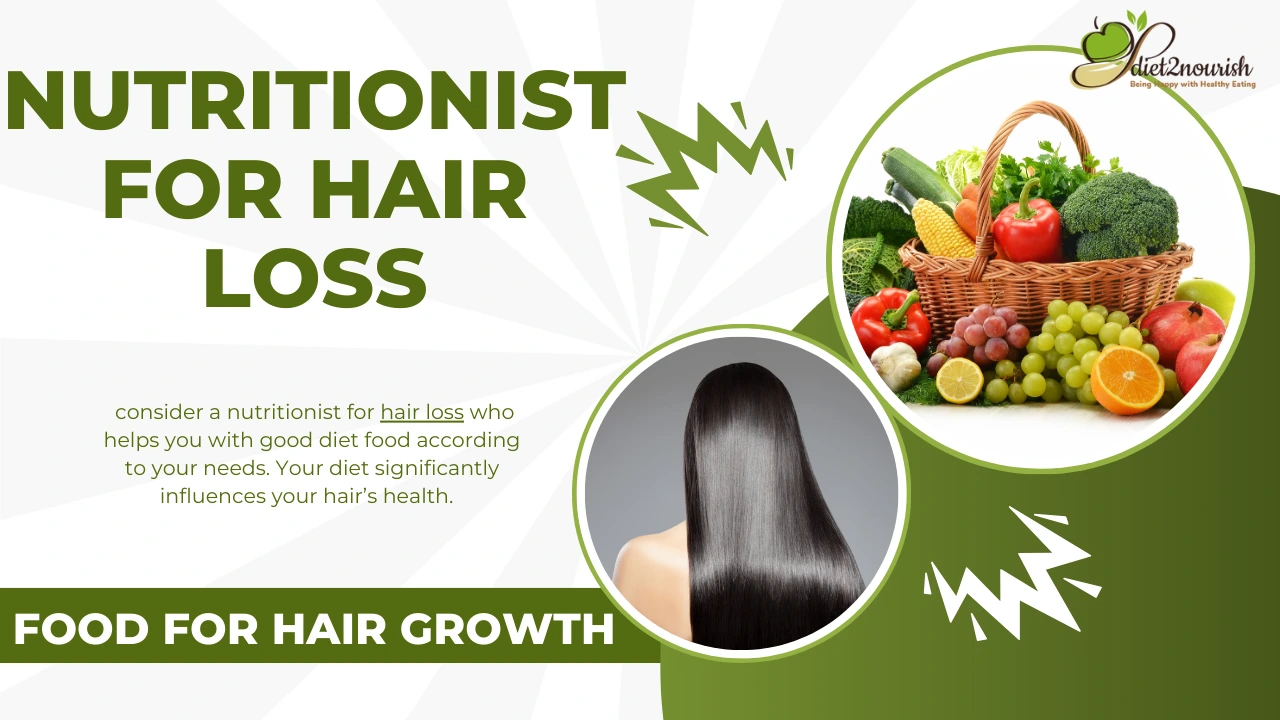The average person loses between 50 and 100 hairs every day; however, since the scalp contains over 100,000 hairs, this hair loss typically doesn’t result in any noticeable thinning or loss of scalp hair. Some people may have more severe hair loss on their heads and possibly elsewhere on their bodies. Hair loss may not be a big deal for some people, but for others, it can be devastating and drastically alter their lives. You must have tried many things, but what about a Nutritionist for hair loss?
Yes, getting experts’ advice always helps us everywhere. Similarly, consider a nutritionist for hair loss who helps you with good diet food according to your needs. Your diet significantly influences your hair’s health.
Signs and Symptoms of Hair Loss
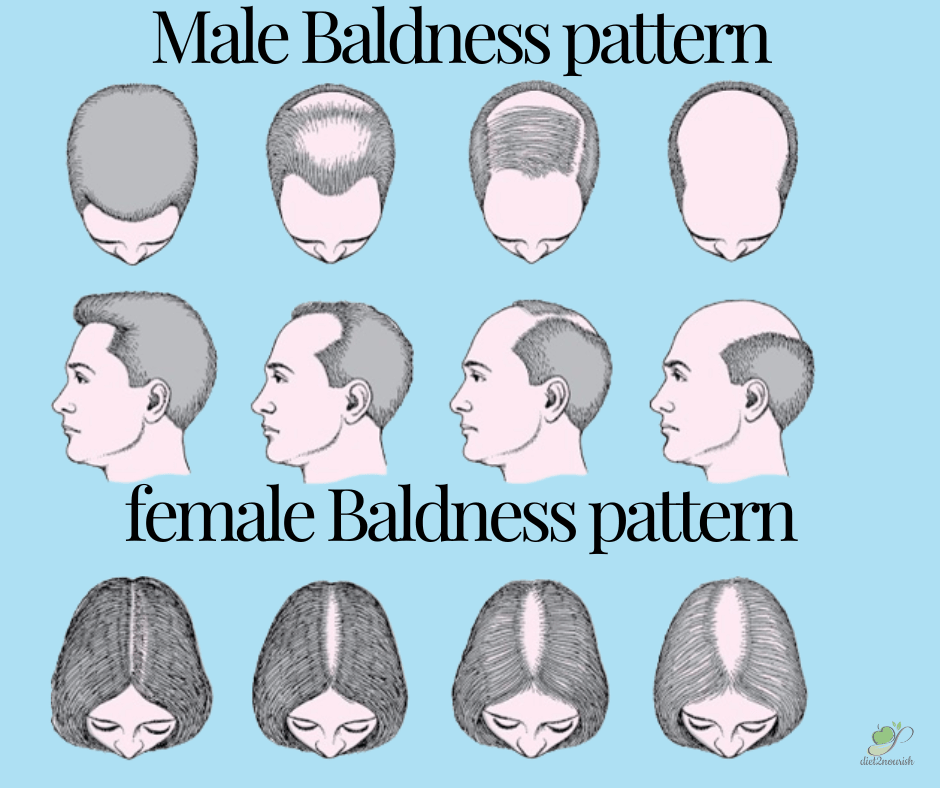
Depending on what is causing it, there are many distinct ways that hair loss can manifest. It can affect only your scalp or entire body and start off suddenly or gradually.
1. Thinned out gradually on top of the head
As people get older, they are more likely to have this sort of hair loss. At the hairline on the forehead, hair frequently starts to recede in men. Typically, women’s hair parts are wider than men’s. A receding hairline is a hair loss pattern that older women experience more frequently (frontal fibrosing alopecia).
2. Patches or circles of baldness
On the scalp, beard, or brows, some persons experience bald spots that are round or spotty. Before the hair falls out, your skin may become unpleasant or itching.
3. Hair suddenly becomes looser
Hair may become loose as a result of physical or mental trauma. You might lose a few handfuls of hair when brushing, washing, or even with a bit of tugging. Although transient, this hair loss typically results in general hair thinning.
4. Complete body hair loss
Hair loss can occur all over your body due to some diseases and medical procedures, such as chemotherapy for cancer. Usually, the hair grows back.
5. Scaling that appears in large patches all over the scalp
This is a ringworm symptom. Broken hair, redness, swelling, and occasionally leaking may also be present.
Why does hair fall happen?
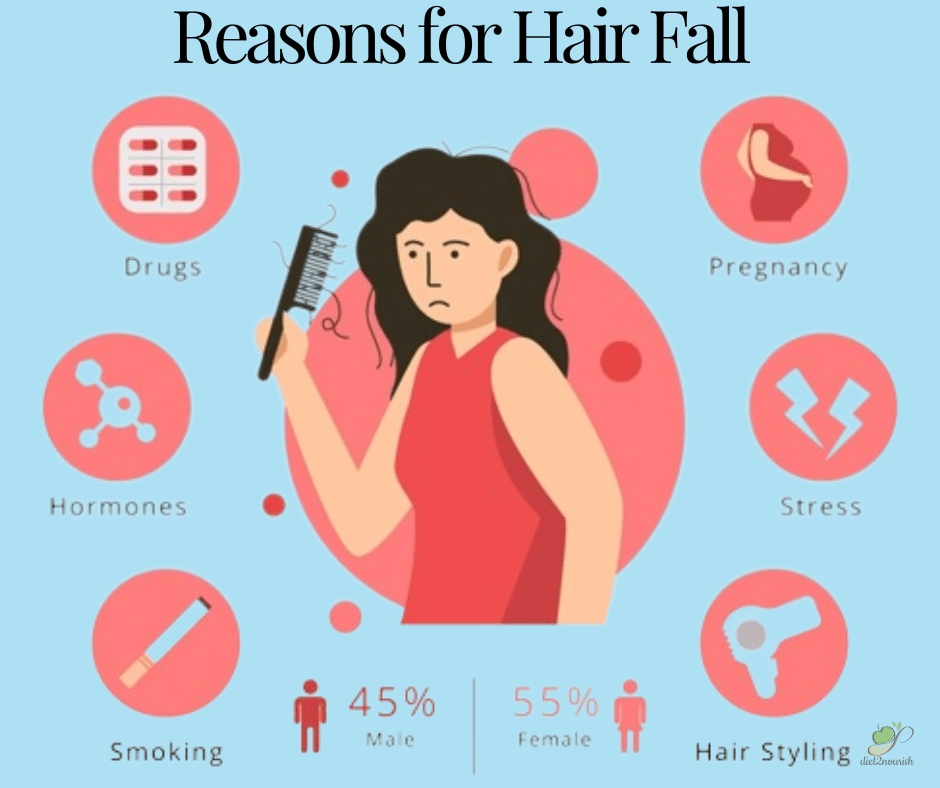
Numerous factors might cause hair to be thin, fall out, or appear unhealthy. There may be a connection between genetics, hormonal factors, medical disorders, and drugs, and there is evidence that lifestyle factors may also be responsible.
Men and women lose hair for different reasons, but a few common ones often affect both sexes. Some of the most considered causes are as follows:
1. Hormonal Irregularities
Numerous types of hair loss, including male and female pattern baldness, hair loss during pregnancy, and hair loss after menopause, are mainly brought on by hormones.
2. Diseases and Disorders of the body
Thyroid issues, scalp infections, and other skin conditions, including lupus, can bring on hair loss. The good news is that hair will regrow when the underlying illness has been addressed.
3. Being on Medications for longer
Certain medications given to people receiving therapy for ailments like heart issues, cancer, depression, arthritis, and high blood pressure can impact healthy hair. Temporary hair loss of this kind is typical.
4. Emotional or mental stress
Particularly emotional stress and nutritional deficits are known to impact good hair substantially. Where consulting a nutritionist for hair loss will help you in every way.
5. Genetics
People with extremely high amounts of a particular male hormone frequently experience both male and female pattern baldness. Given that this condition runs in your family, there is a reasonable probability that you may also experience hair thinning and loss if your immediate family members have.
6. Psychological and Physical Strain
Hair thinning and hair loss can begin in some persons who have undergone severe physical shock or emotional stress. As a result, more hair may enter the shedding phase due to trauma rather than the growth phase.
7. Inadequate Protein
Around 91% of hair is protein. The hair’s cortex (middle part) contains polypeptides and lengthy chains of amino acids that make up protein. Therefore, a diet low in protein might stop hair growth and result in dull, brittle hair.
8. Deficiency of Nutrients
Because iron and zinc are necessary for the growth of hair follicles, a deficiency in either of these elements might result in hair loss. As a result, anemic persons may notice their hair becoming thinner and weaker.
How can Nutritionist help you with Hair Regrowth?
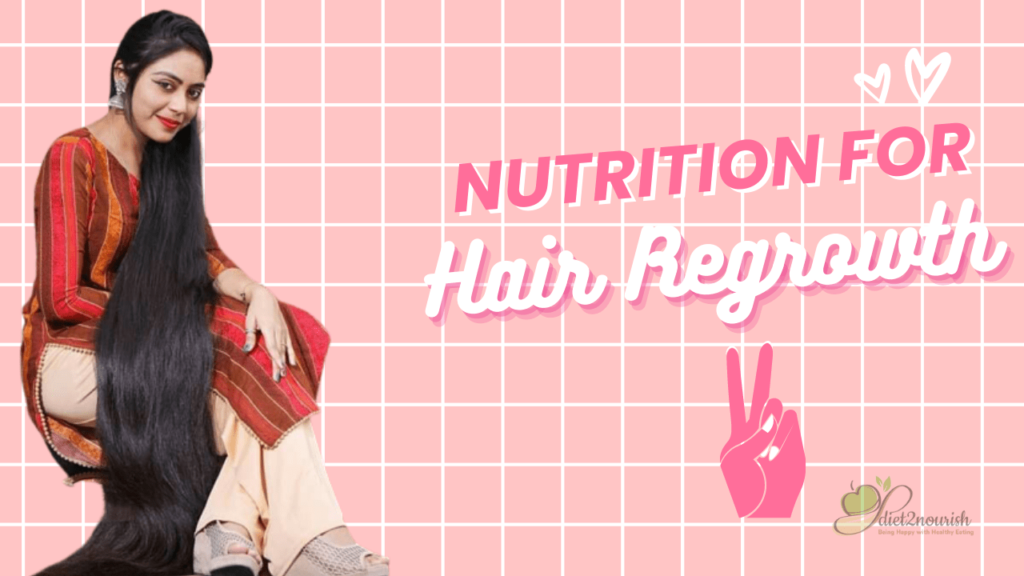
There are several ways to get hair regrowth, but consulting a professional, such as a nutritionist for hair loss is the best option. The following are some justifications for hiring a dietician:
- The best way to achieve hair regrowth is to hire a nutritionist for hair loss that help you understand your nutritional needs.
- Depending on your dietary requirements, they can directly customize menus for you.
- A nutritionist can motivate you if you’re having trouble maintaining a healthy lifestyle.
- Your nutritionist will examine your entire body before providing you with a personalized nutrition plan.
- Any gastrointestinal issues you may experience will be considered, along with your allergies and food intolerance.
- Schedule regular sessions and follow-ups will make you feel more responsible and driven.
Facts about hair loss
- It is easier to slow down hair loss as compared to fastening hair growth. This is why you need to make the necessary changes in life to slow hair loss. The hair growth process is not fast and takes its time.
- Hair loss is significant to other people when you lose about 50% of your hair strands.
- Male pattern hair loss in five out of ten men is seen around the age of 50.
- Hairlessness and falling of hair can be due to hormonal imbalance in women.
- Baldness due to Heredity is inherited by the mother or the mother’s side of the family.
- Hair loss caused by thyroid imbalance or nutrient deficiency is reversible.
- With an appropriate diet and hair care, you can get healthy hair. In addition, the process can be time-consuming.
Food for hair growth and thickness
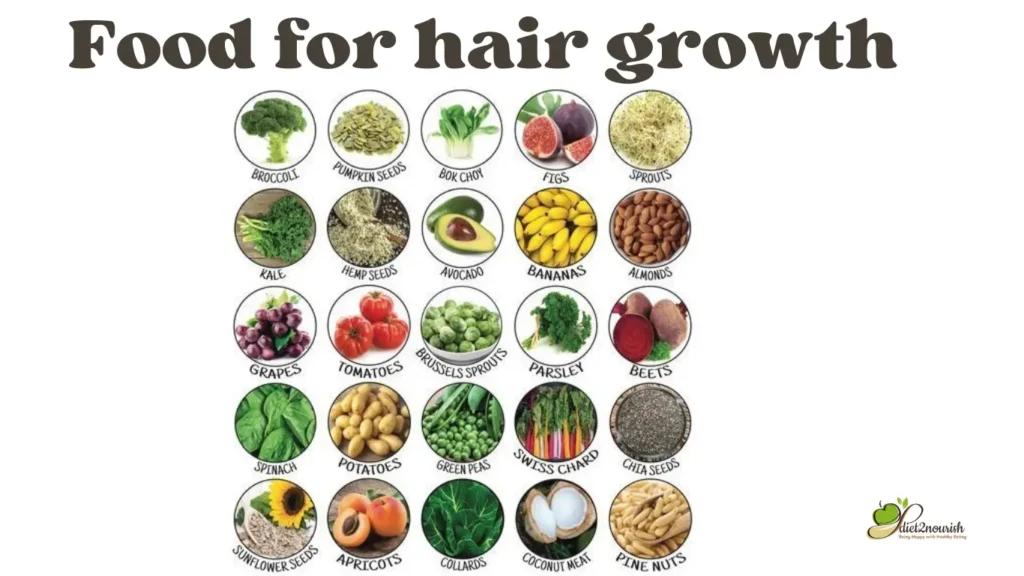
Best fruits for hair growth
The following fruits are the best fruits for hair growth
- Avocados
- Peaches
- Strawberries
- Oranges
- Kiwi
- Bananas
- Pineapple
- Apple
Best vegetables for hair growth
These are the best veggies that you can eat for hair thickness
- Spinach
- Garlic
- Tomatoes
- Sweet potatoes
- Beet roots
- Carrots
What to eat to stop hair fall immediately?
You can eat these foods to stop hair fall immediately.
1) Lentils
Lentils are rich in folic acid. They help your body to produce more red blood cells. This leads to faster hair growth. Chickpeas can also be consumed to stop hair fall.
2) Seeds
Seeds like flax seeds, chia seeds, sunflower seeds etc. help in hair growth. They are rich in minerals like selenium and zinc. Furthermore, seeds are rich in vitamin E.
3) Dairy products
Dairy products are rich in calcium which plays a key role in hair growth. Moreover, dairy products are rich in proteins like casein and whey. They help in reducing hair loss.
Hair loss due to poor diet : is it reversible?
Yes, hair loss due to a poor diet is reversible. A dietician can help you reduce hair fall by framing an appropriate diet plan.
Hair loss is caused by various reasons. In the case of a poor diet, the hair loss is reversible and can be controlled.
Nutrients like riboflavin, biotin, folate and vitamin B12 are associated with hair loss. Therefore, these nutrients must be included in the diet to prevent hair loss.
In addition, a diet rich in protein and these nutrients play a vital role in reversing hair loss.
When to visit a Nutritionist for Hair Loss?
If you or your child is experiencing persistent hair loss and wish to seek treatment, make an appointment with your doctor. Discuss early treatment options with your doctor if you’re a woman suffering from a receding hairline (facial fibrosing alopecia) to prevent significant permanent baldness.
Additionally, consult your nutritionist for hair loss if you notice more hair falling out than usual when brushing or bathing your child’s or your own hair or if it falls out suddenly or in patches. Sudden hair loss can indicate an underlying medical condition that needs to be treated.
Your nutritionist for hair loss will focus on nutrition and help you by advising gaining hair. Although we frequently have a general notion of our objectives, it may be challenging to be more precise and set a deadline. We at diet2nourish always help you at each and every step of your hair gain journey. Our nutritionist for hair loss can assist by providing a frank and insightful opinion.
Frequently Asked Questions (FAQs)
Can nutritionists and dieticians help with hair loss?
Answer:
A dietician or nutritionist can definitely help with hair loss. By devising a healthy hair diet plan, they can solve your hair problems. The diet consists of certain foods that encourage stronger regrowth. It would also slow the hair loss process.
Can you regrow hair with nutrition?
Answer:
This is possible in case the hair loss is caused due to certain deficiencies. With an appropriate diet plan and nutritional intake, hair can be regrown. Moreover, several nutrients nourish the hair which helps in hair health.
Can vitamin D regrow hair?
Answer:
Vitamin D causes the proper functioning of hair follicles. Furthermore, it prevents hair fall by strengthening the roots. Therefore, vitamin D can help regrow hair.
Is B12 deficiency hair loss reversible?
Answer:
As soon the deficiency is treated, hair loss is reversed. Therefore, B12 deficiency hair loss is reversible. It is done by consuming a diet rich in vitamin B12.








